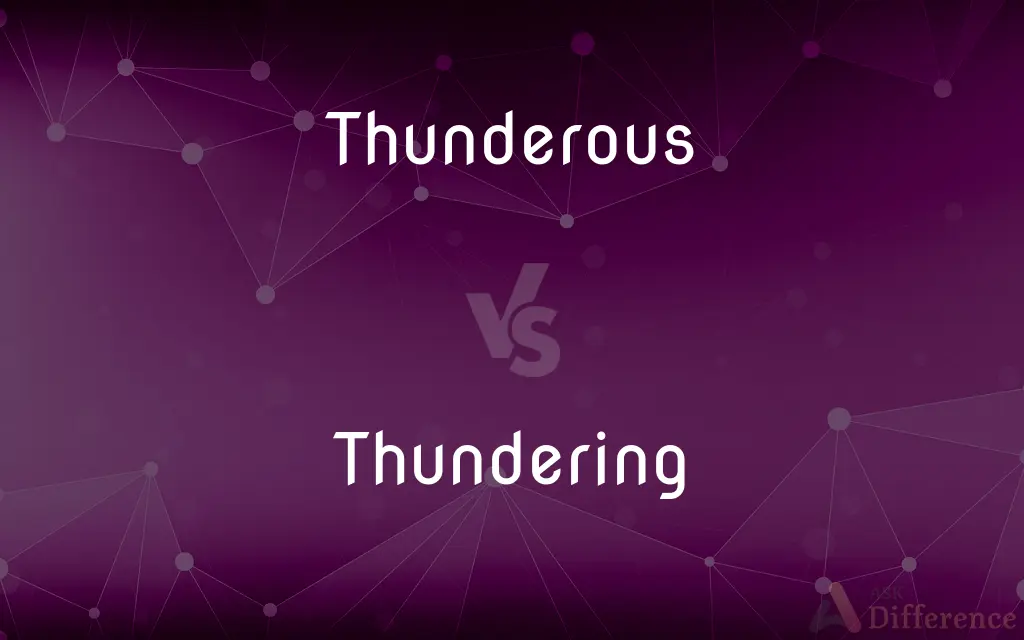Thunderous vs. Thundering — What's the Difference?
By Tayyaba Rehman & Maham Liaqat — Updated on April 4, 2024
Thunderous describes something extremely loud or powerful, like a roar, while thundering refers to the sound or action of thunder specifically.

Difference Between Thunderous and Thundering
Table of Contents
ADVERTISEMENT
Key Differences
Thunderous and thundering both relate to loud, resonant sounds, but they are used in slightly different contexts. Thunderous is often used to describe sounds or effects that are extremely loud or powerful, resembling thunder but not limited to it. It can apply to roars, applause, or even actions that have a massive impact. On the other hand, thundering specifically refers to the sound or action of thunder itself, indicating a direct relation to storms and atmospheric phenomena.
While thunderous can describe a variety of loud, impactful noises or situations that metaphorically shake the environment, thundering is more narrowly focused on the actual sound produced by thunder. This distinction makes thunderous more versatile in its application, capable of describing sounds or effects in both literal and figurative senses, whereas thundering remains closely tied to its meteorological roots.
In literature and speech, thunderous is used to amplify the intensity or magnitude of a situation or sound, often adding a dramatic or imposing quality. Thundering, while also dramatic, conveys a more specific imagery of thunder, making it a more precise descriptor when the intent is to evoke the actual sounds or effects of a storm.
The emotional or symbolic connotations of these words also differ. Thunderous can be used to describe something awe-inspiring or overwhelming, evoking a sense of power or majesty. In contrast, thundering might be used to suggest not only loudness but also the approach or presence of a powerful, potentially threatening force, often nature itself.
Comparison Chart
Definition
Extremely loud or powerful, resembling but not limited to thunder
Specifically refers to the sound or action of thunder
ADVERTISEMENT
Usage Context
Broad, can describe various loud or impactful situations
Narrow, directly tied to thunder and its associated phenomena
Literary Application
Adds drama or intensity, often in a metaphorical sense
Evokes specific imagery of storms and natural power
Emotional Connotation
Implies awe or majesty, can be overwhelming
Suggests the presence of a powerful, natural force
Common Examples
Thunderous applause, thunderous roar
Thundering skies, thundering storm
Compare with Definitions
Thunderous
Often used to describe awe-inspiring or overwhelming phenomena.
The speech was met with a thunderous standing ovation.
Thundering
Evokes the power and unpredictability of nature.
The thundering waves crashed against the shore in the storm.
Thunderous
Extremely loud or impactful, suggesting a powerful force.
The concert ended with thunderous applause from the audience.
Thundering
Suggests the presence of a storm or tumultuous force.
The thundering clouds promised a heavy rainfall.
Thunderous
Suitable for both literal and metaphorical applications.
The announcement had a thunderous impact on the crowd.
Thundering
Directly associated with atmospheric phenomena.
The night was illuminated by lightning and thundering echoes.
Thunderous
Creates an image of power and intensity.
The silence was broken by a thunderous crash.
Thundering
Making a loud, rumbling sound like thunder.
The sky was filled with the thundering roar of the storm.
Thunderous
Can apply to a wide range of loud sounds or impactful actions.
His thunderous footsteps echoed through the hallway.
Thundering
Specifically related to the sounds produced by thunder.
We were awakened by the thundering clap overhead.
Thunderous
Relating to or resembling thunder
A thunderous grey cloud
Thundering
Making a resounding, loud, deep noise
Thundering waterfalls
Thunderous
(of a person's expression or behaviour) very angry or menacing
Robin's thunderous mood hadn't lightened
Thundering
Extremely great, severe, or impressive
A thundering good read
A thundering bore
Thunderous
Producing thunder or a similar sound.
Thundering
The crashing or booming sound produced by rapidly expanding air along the path of the electrical discharge of lightning.
Thunderous
Loud and unrestrained in a way that suggests thunder
Thunderous applause.
Thundering
A sound that resembles or suggests thunder.
Thunderous
Very loud; that sounds like thunder; thundersome. Also in metaphorical expressions, signifying fury.
Thundering
To produce thunder.
Thunderous
Producing thunder.
How he before the thunderous throne doth lie.
Thundering
To produce sounds like thunder.
Thunderous
Making a noise like thunder; sounding loud and deep; sonorous.
Thundering
To move while making a loud noise
The express train thundered past us.
Thunderous
Loud enough to cause (temporary) hearing loss
Thundering
To utter loud, vociferous remarks or threats.
Thunderous
Extremely ominous;
World events of thunderous import
Thundering
To express violently, commandingly, or angrily; roar.
Thundering
Present participle of thunder
Thundering
Of, pertaining to, or accompanied by thunder.
Thundering
Producing a noise or effect like thunder; thunderous.
Thundering
(colloquial) Very great; extraordinary.
Thundering
A loud percussive sound, like thunder.
Thundering
(archaic) A thunderstorm.
Thundering
Emitting thunder.
Roll the thundering chariot o'er the ground.
Thundering
Very great; - often adverbially.
Thundering
Thunder.
Thundering
Sounding like thunder;
The thundering herd
Thundering
Extraordinarily big or impressive;
A thundering success
The thundering silence of what was left unsaid
Common Curiosities
What does thunderous mean?
Thunderous describes something extremely loud or powerful.
How do thunderous and thundering differ in usage?
Thunderous is broader, applicable to various loud or impactful contexts; thundering is specific to thunder or similar sounds.
What does thundering mean?
Thundering refers specifically to the sound or action of thunder.
Is thundering used only in the context of weather?
Primarily, though it can metaphorically describe other deep, rumbling sounds.
What is a common example of thundering in nature?
The sound of a thunderclap during a storm.
Is thunderous applause a positive expression?
Generally, yes, indicating strong approval or enthusiasm.
What imagery does thundering evoke?
The imagery of storms, power, and natural forces.
Can thunderous be used to describe things other than sound?
Yes, it can describe anything impactful or intense, not just sound.
Can thundering be used to describe emotions?
Metaphorically, to describe intense, perhaps tumultuous feelings.
Why choose thunderous to describe a reaction?
To emphasize the overwhelming power or intensity of the response.
How do the emotional connotations of these words differ?
Thunderous can awe or overwhelm; thundering often suggests the approach of power or danger.
Can a voice be described as thunderous?
Yes, to denote a very loud or commanding voice.
How do writers use these terms differently?
Thunderous for dramatic, powerful imagery; thundering for specific, storm-related descriptions.
What might a thunderous impact refer to?
A very loud noise or a significant, powerful effect.
Can music be described as thundering?
Yes, if it has a deep, powerful, rumbling quality.
Share Your Discovery

Previous Comparison
Raft vs. Boat
Next Comparison
Title vs. TittleAuthor Spotlight
Written by
Tayyaba RehmanTayyaba Rehman is a distinguished writer, currently serving as a primary contributor to askdifference.com. As a researcher in semantics and etymology, Tayyaba's passion for the complexity of languages and their distinctions has found a perfect home on the platform. Tayyaba delves into the intricacies of language, distinguishing between commonly confused words and phrases, thereby providing clarity for readers worldwide.
Co-written by
Maham Liaqat














































